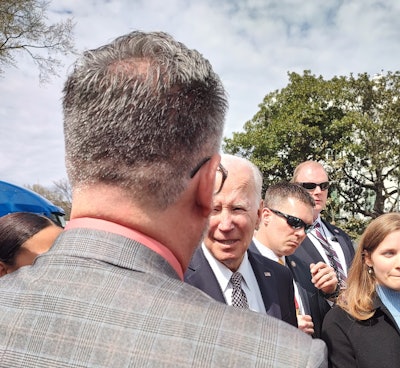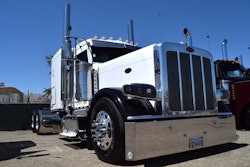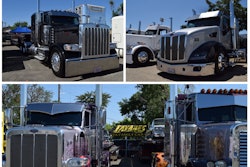Outside looking in, it might have looked like the Biden Administration was on a roll, of a fashion. Influential trucking organizations had lauded much of what the infrastructure bill passed last year in Congress stood to do for the nation's roads in the years to come. A variety of businesses and organizations were lining up to sponsor registered apprenticeships in response to the administration's late-year 2021 call for such, ultimately part of a Trucking Action Plan some felt might help alleviate pressures many trucking newbies experience getting a footing in the business.
Department of Transportation Secretary Pete Buttigieg was saying the right things on truck parking, if the long quest for dedicated, specifically earmarked funding continued to be just that.
In early April, the White House invited a bevy of trucking reps to the White House, where it touted that Trucking Action Plan and spoke to tackling issues of compensation, working conditions, parking and undue detention long of concern to so many of those who do the real work of trucking.
It wasn't just D.C.-area businesses or industry association-affiliated lobbyists who attended that event. Here's North Carolina-headquartered owner-operator William McKelvie at the moment of his brief talk and handshake with the President on that day.

 Owner-operator McKelvie (left) in conversation with President Biden in early April.
Owner-operator McKelvie (left) in conversation with President Biden in early April.
McKelvie got the invite from the President's office itself a few months after participating in a December hearing in South Carolina, where he shared concerns of owner-operators across the country, some affiliated with a group called Truckers Movement for Justice, others (like him) unaffiliated with established associations. At the December 18, 2021, meeting in Charleston, McKelvie voiced "concerns that had been brought to me from different truckers, across the nation," he said. "During the meeting, the main purpose of TMJ was to discuss the fact that drivers are not being paid for all hours worked, nor wait time, or other accessorial charges that the companies receive," when it's the drivers doing the actual work.
There was testimony about the port drivers, McKelvie noted, "and others facing long hours of wait times ... improper leases, and everything involved in that, as well. Other topics discussed were double/triple brokering."
Notably, not once, he said, did the subject of speed limiters or any mandate come up among priorities voiced from federal agency representatives or among concerns from those in attendance.
McKelvie's invitation to the White House lawn followed months later, and he was honored to attend, he said. McKelvie there thanked Biden for his "efforts, determination, and actions in regards to the industry" and urged him to keep it going, from establishment of the Truck Leasing Task Force set to examine lease-purchase arrangements and more.
"This is not the time to stop nor slow down any of these or other efforts," McKelvie said. "They need to keep pressing on, strongly."
He felt then that what Biden and company were doing, involving not only industry and FMCSA but agencies across government, stood in contrast to previous administrations' efforts to address the most significant issues facing the industry. "We now have the U.S. Department of Labor, DOT and the FMCSA all looking into all of these items," he said, "brought forward to this administration in Charleston and across the nation."
Being in-person at the White House McKelvie characterized as "a pretty big deal to me. Since I am not really on any large organization or association, I try to work with many associations, and organizations, and hope they all come together to make things better for the drivers soon." He added that "if I can get there and have these meetings on my own, others should be able to do the same."
Barely three weeks after the White House meeting, though, FMCSA dropped a new message on the trucking world, signaling intent to move forward with a mandate for carriers to use speed limiting technology.
We've written plenty about the reaction from Overdrive's principal audience of owner-operators and small fleets in the aftermath, and very little of that reaction has been sunny toward the notion of any speed-limiter requirement.
[Related: 'Dumbest idea I've ever heard': Owner-operators say no to speed-limiter mandate]
McKelvie himself, like so many owner-operators opposed to any speed-limiter mandate, comes down similarly. His public comment on the speed-limiter rule emphasized that there's fundamentally no substitute for "proper training, proper driver evaluation, company supervision and corrections" when it comes to the prevention of accidents. Those "corrections" could include, he noted, "repeat and/or advanced training ... A device that limits speed does not train you to avoid accidents, nor any other basic driving skills. It also does not teach you one of the most important tools that a driver has at their disposal, to always leave a way out."
As have others, he suggested FMCSA might "place their focus on enforcement" by targeting "companies that show repeated speeding violations. It's not like the data is not there for them and everyone else to see."
Indeed, and on the whole, as shown in the chart, speeding violations have been elevated as a percent of all violations issued nationwide to truckers in the last couple of years, yet real numbers show a general decline in speeding enforcement, as fewer stops have been made and inspections conducted, our CSA's Data Trail 2022 update showed.
As noted in the chart, "in real-numbers terms, speeding violations marked on inspection reports in 2021 (141,071 violations issued in RigDig's accounting) are down 4.5% from 2018 levels (147,646)."
Said McKelvie, "Shouldn't they be more concerned with lack of inspections [than] speed limiters?"
The National Association of Small Trucking Companies' public comment on FMCSA's notice of intent to move forward with a speed-limiter-use mandate dubbed it the latest evidence of the agency's willingness to pursue regulatory policy items that clearly have not succeeded at the legislative level, despite several attempts to codify a mandate in law.
As wrote NASTC President David Owen:
Clearly, the legislative branch has shown no appetite for considering -- much less enacting -- mandatory speed limiters on commercial vehicles. Yet, Congress has been active in the related policy area. Congress has had ample opportunity to require speed limiters on trucks by legislative action; yet both bodies of Congress have elected not to give a speed limiter mandate even a hint of interest. For regulatory agencies to revive a withdrawn rule in spite of Congress’s rejection of such a policy through the appropriate -- legislative --channels appears the height of hubris and arrogance.
Owen contended reviving the pursuit of a regulatory mandate, particularly given FMCSA and NHTSA's analysis the last time around that a mandate "could put owner-operators and small fleet owners, particularly those not using team driving strategies, at a disadvantage," was likely to further "foster mistrust and disrespect of the agencies."
In essence, sacrificing whatever goodwill the current and former administrations' efforts around trucking might have fostered among the wider trucking public.
McKelvie sees the speed-limiter mandate as an issue separate from the bedrock concerns he's been advocating around, and believes its principal proponents are large-carrier interests, certainly a minority of the wider trucking community, "who believe for some reason this will stop or even lower the accident rate."
He maintains that progress has been made for some good in other areas, hopeful in particular that the recently introduced truck-parking legislation makes some headway, among other efforts. The establishment of the Truck Leasing Task Force "is a good start in the right direction," he said, yet we wait for an announcement of just who will be on it, and a timeline for its work. "We all know the wheels in D.C. move slowly, but I do think we are making some progress, to some degree."
Thinking about FMCSA leadership, he recalled fondly past Administrator Ray Martinez. "We need another Martinez in charge of the FMCSA," he said, someone he felt understood "the working men and women, and our concerns," rather than someone willing to work for interests around trucking in favor of "whimsical fantasy devices instead of proper training and education."
Your take?
[Related: FMCSA's Hutcheson clear hurdle toward confirmation as agency's boss]











